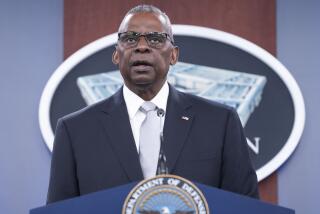U.S. to Pay for Non-Iranians It Shot Down
- Share via
WASHINGTON — The Bush Administration said Monday that it has begun discussions with India, Italy, Pakistan, Yugoslavia and the United Arab Emirates to arrange compensation payments for the deaths of the 40 non-Iranians killed when a U.S. warship shot down an Iranian civilian airliner last year.
State Department spokesman Richard Boucher said the Administration decided to expedite payments to the families of the non-Iranians instead of waiting for the resolution of a Washington-Tehran dispute, which has stymied a U.S. compensation offer for the 250 Iranian victims.
He said that the non-Iranians were 10 Indians, one Italian, six Pakistanis, 17 citizens of the Emirates and six Yugoslavs.
“In general, the United States has offered to pay $250,000 per full-time wage-earning victim and $100,000 for each of all the other victims,” Boucher said.
By contrast, the United States and Iraq agreed earlier this year on $27.3 million in compensation to the families of the 37 crew members killed when an Iraqi jet attacked the U.S. Navy frigate Stark in 1987 in the Persian Gulf. That is an average of $739,200 per victim.
The U.S. cruiser Vincennes downed Iran Air Flight 655 with an anti-aircraft missile on July 3, 1988, after the ship’s crew mistook the civilian jumbo jet for an Iran air force F-14. Eight days later, then-President Ronald Reagan offered to pay compensation, but only as an act of charity. Reagan said the United States refused to accept blame for the incident, which occurred shortly after the Vincennes engaged in a brief exchange of fire with Iranian gunboats.
“During the past year, the United States has developed an appropriate plan for paying ex gratia compensation,” Boucher said. “On July 10, 1989, the United States instructed its embassies in India, Italy, Pakistan, Yugoslavia and the United Arab Emirates to approach the governments in those countries proposing that specific payments be accepted on behalf of their nationals.
Tehran Drags Its Feet
“The same offer has been communicated to the government of Iran,” he said. “Unfortunately, during the past year the government of Iran has ignored repeated efforts by the United States to obtain information on the families of the Iranian victims. The United States stands ready to make payments to these families so long as the government of Iran permits an appropriate intermediary to distribute the funds to the families.”
The United States refuses to make payments directly to the Iranian government, insisting that the money be funneled through an intermediary. So far, Iran has rejected that condition.
Boucher said that Washington demanded a middleman for payments to Iranians because the United States has no diplomatic relations with Tehran.
A senior State Department official said that the total outlay could reach $30 million if the U.S. terms are extended to include the Iranian victims.
The official, who briefed reporters on the understanding that he not be named, said that the U.S. offer was “a humanitarian gesture,” made even though the commander of the warship was justified in authorizing firing in self-defense in the heat of battle.
More to Read
Sign up for Essential California
The most important California stories and recommendations in your inbox every morning.
You may occasionally receive promotional content from the Los Angeles Times.













